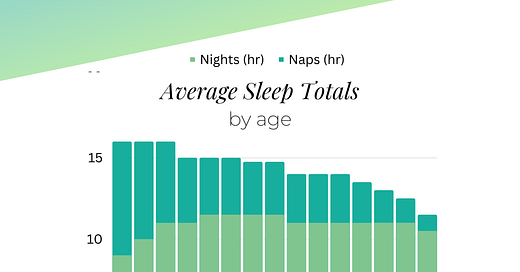How Much Sleep Does Your Baby Need?
What you can learn from the averages, the range of normal, and your individual child
When my daughter was a month old, she fought every nap like it was her job. I remember feeling buried in infographics and Instagram posts about how my newborn baby should be getting 16-18 hours of sleep per 24-hour period, how she should only be awake 45 minutes at a time, and how I should have to wake her from those sweet three-hour naps to make sure she got fed—all while wondering what was wrong with my kid, who might get 20 minutes of sleep in 6 hours if I was lucky.
I was sure that she was broken, or if she wasn’t, my inability to make her sleep as much as everyone said she needed to was going to break her.
Now, 20 minutes of sleep in a 6-hour period is going to mean one incredibly overtired newborn baby, and there were red flags I needed to address because of this (part of the problem turned out to be that she was HUNGRY—we worked with an IBCLC for several weeks to find out we had a lot of feeding complications that made it tough for her to transfer milk). But at the same time, blanket claims like “Your newborn needs 16-18 hours of sleep every day” or “Your one-year-old should be taking a 3-hour daily nap” tend to err on the high end and be overly broad. This can lead to a lot of anxiety for parents whose kids are sleeping less.
How sleep needs change over time
From birth to late toddlerhood, the average sleep a child needs in 24 hours drops from around 15-16 hours to around 11-12 hours. Remember, this is an average, not a rule. And in the same time period, the distribution of sleep between nighttime and naps gradually changes from nearly equal in the newborn days to fully or almost fully consolidated into the night by 3-5 years old.
Notice on the graph how the night hours grow longer and longer from newbornhood to sometime around one year of age, and then they may begin to shorten just a little as sleep needs decrease overall (and, often, as the parent attempts to preserve the nap for as long as possible). Naps, in the meantime, consistently decrease in both number and duration until there is no nap at all around preschool or school age.
Okay, but how much sleep does your baby actually need?
A longitudinal study on 493 Swiss children from birth to 16 years of age was conducted to help answer this question. What this study found was that sleep totals are a spectrum with quite a wide range of “normal,” but they can still offer us at least a rough guideline. Here are some of the results found from birth to 2 years of age:
Total sleep in 24 hours (night + naps)
1-3 months old: 14-15 hours average (with a range of 9-19 hours)
6-9 months old: 13.9-14.2 hours average (with a range of 10.4-17.4 hours)
1 year old: 13.9 hours average (with a range of 11.4-16.5 hours)
18 months old: 13.6 hours average (with a range of 11.1-16 hours)
2 years old: 13.2 hours average (with a range of 10.8-15.6 hours)
Total daytime sleep (naps only)
1-3 months old: 5-6 hours average (with a range of 1-9 hours)
6-9 months old: 2.8-3.4 hours average (with a range of 0.2-6.4 hours)
1 year old: 2.4 hours average (with a range of 0.2-4.6 hours)
18 months old: 2 hours average (with a range of 0.5-3.6 hours)
2 years old: 1.8 hours average (with a range of 0.7-2.9 hours)
One of the most helpful findings from these statistics, in my opinion, is simply the reality that baby sleep is incredibly variable across individuals! Yes, there are averages to look at if you need to find a ballpark estimate to aim for, but there is also a massive range—so your kid really might be as low- or as high-sleep-needs as you suspect! The best way to know for sure that your child is getting enough sleep for them is to observe their mood and demeanor during their awake times, and their readiness for and quality of sleep during their sleep times.
Signs your baby isn’t getting as much sleep as they need
They seem tired, cranky, and/or irritable a lot of the time
They cry a lot and are difficult to settle
They fight against going to sleep
They get sudden “second winds” where they don’t appear to be tired at all
They have a lot of false starts (waking up crying 45 minutes after going down for the night)
They have frequent, very upset night wakings
They wake up very early in the morning
Signs your toddler/preschooler isn’t getting as much sleep as they need
They seem tired, cranky, and/or irritable a lot of the time
They wake up in a bad mood
They have a lot of tantrums, power struggles, and/or bedtime stalling/protest
They may display high energy or hyperactivity where they don’t seem tired at all
They struggle with change or transitions more than seems appropriate or expected
They have a lot of night wakings
They wake up very early in the morning
Could your child be getting more sleep than they need?
It’s highly unlikely that your healthy baby or toddler will actually sleep too much—their bodies will typically max out on sleep and simply not allow them to sleep any more than that. When this happens, you may notice signs like taking a long time or a lot of effort to fall asleep for bedtime or naps, skipped or shortened naps, long and happy night wakings (split nights), happy early morning wakings, resistance/stalling for bedtime, etc.
If, however, you have any concerns or it seems they are suddenly sleeping far too much, always bring it up with your pediatrician to rule out any underlying concerns!





